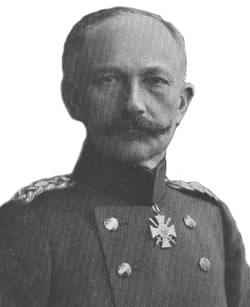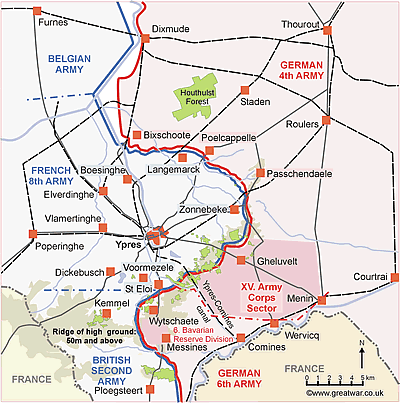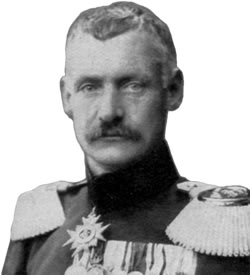German resistance to the new gas weapon

1 March 1915
According to the German official military history Der Weltkrieg 1914-1918 there was significant resistance to the new weapon among German commanders and their troops. Some were totally against the use of a deadly poison for moral reasons. It was considered to be rather distasteful. However, could it be considered to be any less distasteful to blow the enemy apart with artillery shells and bullets? If the new weapon of gas proved to be a means to an end, helping the German troops to leave their trenches and the misery of trench warfare, it was possibly worth trying.(1)

|
As an untried weapon it was mistrusted; the method of its use was completely reliant on the direction of the wind. In Flanders the wind was unreliable and it was a concern that troops could be kept waiting in readiness to make a scheduled attack if the wind direction was wrong for that time or date. With the likelihood of deferred times for the attack, there was a high chance that the the Allies might discover what was hidden in the Geman front lines.
Troops on duty in the front lines where the cylinders were installed were extremely nervous; the risk of being poisoned at close range by huge quantities of gas escaping if cylinders were damaged by enemy shelling was simply very frightening. Senior commanders did not rate it highly. Der Weltkrieg 1914-1918 states that during the preparation for the Galician operation on the Eastern Front the commanders refused to use it because they did not want to have to depend on an untried weapon.(2)
General Deimling, commander of the XV. Corps, whose sector in Flanders had been selected to carry out the first trial of cloud gas, was disgusted by the deliberate intent to poison enemy soldiers. Nevertheless, he considered that if this weapon did lead to a successful breakthrough of the Allied line and the capture of Ypres, it could result in a decisive swing to the Germans to bring the campaign to an end.(3)
The use of gas on the Ypres front was going to have to prove its worth if it was to be accepted by the German Army.
Misgivings by the German 6th Army Commander

With reference to the decision by German Supreme Command to open up chemical warfare on the enemy, Crown Prince Rupprecht of Bavaria, Commander of the German 6th Army, expressed his misgivings.
In the following extract from his diary of 1st March 1915 Prince Rupprecht referred to the 6. Bavarian Reserve Division having found a French shell containing poisonous gas. This division was part of Rupprecht's 6th Army and at that time was serving in the sector Messines-Wyteschaete, south of Ypres.
Prince Rupprecht's diary entry is as follows:
“The 6. Bavarian Reserve Division has found and handed in a French shell, which contained metal phials filled with poisonous gases. This was a welcome 'find' for our Supreme Command, as the use of these sort of gases by the enemy has frequently been reported by our troops. Since the enemy has begun to use this prohibited weapon our side is also now intending to put it to use.
However, I have reservations about the prospects of success for the new technique of assault on the enemy with gas, as has been devised by the chemist Dr. Haber. The procedure is to be tried out as soon as possible in an attack to take the town of Ypres from the Allies. The procedure involves building cannisters filled with chlorine gas into the German trenches. With a favourable wind, that is a south-easterly wind, the contents of the gas cannisters will be released and will drift towards the enemy positions. As soon as the enemy's troops are literally 'knocked out' the German troops will storm the position.
Crown Prince Rupprecht of Bavaria, Commander of the German 6th Army, located on the left flank of the XV Corps and the trial attack area for the gas weapon. 
When Dr. Haber and General von Falkenhayn stayed with me before the gas trials were carried out in Flanders for the first time I didn't conceal my feelings from them. I consider this new weapon is not only distasteful, but envisage the potential danger from it for our own troops; if the gas is successful in the attack then the enemy will doubtless start to use the same method against us, and with even greater success. In Flanders, as in northern France, the wind seldom blows from the south-east. Predominantly the wind blows west-east, thereby giving ten times more opportunity for the enemy to blow gas towards our positions instead of us blowing it towards him.
In response to my concern I was told by Dr. Haber that our enemy's chemical industry was not capable of producing gas on that large a scale. I replied that this may well be the case at present, but that I doubted it would remain so.” (4)
Acknowledgements
(1) Königlich Preussisches Reserve-Infanterie-Regiment 213
(2) Der Weltkrieg 1914-1918: Sommer und Herbst 1915, 8. Band
(3) Gas! The Battle for Ypres 1915, p. 23
(4) Der Erste Weltkrieg, Dokumente: Rupprecht, Band I, pp. 304-305